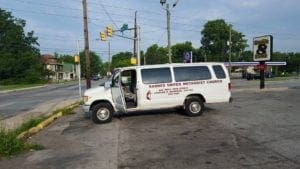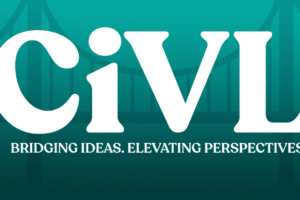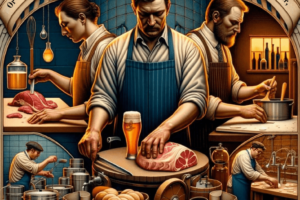This article was featured in our weekly newsletter, the Liberator Online. To receive it in your inbox, sign up here.
Last month, after serving mid to low-income neighborhoods for nearly 60 years, Double 8 Foods made the decision to close all five of their Indianapolis locations following many years of declining revenues. Immediately, community leaders turned to city government for an answer, asking the Mayor to find a workable solution. The “food desert” in areas that could not support the chain’s five locations quickly became an issue for candidates in this fall’s mayoral election.
 Rather than waiting the couple weeks it took to begin “talks” with Indianapolis Mayor Greg Ballard, one prominent community leader took only a few days to mobilize a shuttle service to minimize the impact of the stores’ closures in the short-term. That leader is Senior Pastor of Barnes United Methodist Church on Indianapolis’ westside Charles R. Harrison.
Rather than waiting the couple weeks it took to begin “talks” with Indianapolis Mayor Greg Ballard, one prominent community leader took only a few days to mobilize a shuttle service to minimize the impact of the stores’ closures in the short-term. That leader is Senior Pastor of Barnes United Methodist Church on Indianapolis’ westside Charles R. Harrison.
Waiting for Big Government to come along to solve this problem is not an option for Harrison and the area churches in the communities that these stores served. They jumped into action by providing transportation with their church vans from the now-closed Double 8 stores to other grocery stores unreachable by foot and cumbersome to navigate by IndyGo, Indianapolis’ mass transit bus system.
Reverend Harrison also led by example, driving the shuttle himself while recruitment efforts for volunteers to handle the thrice-daily trips for the neighborhood bore fruit. Churches in the affected areas quickly followed suit, shuttling dozens of former Double 8 shoppers to Aldis, Safeways, and Wal-Mart Neighborhood Markets just a few miles away.
One candidate for Indianapolis mayor identified it as a problem, pledging “to work with state, federal and local leaders to explore bringing more food options to the city,” while the other wants to use “economic incentives” to attract grocery retailers to these areas and use the tax dollars collected to fund neighborhood improvements. Both mayoral candidates clearly favor a slow-moving Big Government solution, while residents seek to meet the immediate need of stocking their pantries and refrigerators.
While Harrison’s efforts are clearly an interim measure to minimize the pain felt by area residents, it provides a bridge to what happens next in the city, in a peaceful and voluntary way. This week, donations to defray the costs of the shuttle service began to appear at the church and at the shuttle stops, so it’s possible this initiative may become a full-fledged program until new or existing grocers, co-ops, or community gardens fill the void.
Isn’t it awesome when people come together without coercion or force to do some good?
Now that you see how immediately someone can act to help the most vulnerable among us without outsourcing responsibility to Big Government, what can you do in your neighborhood or city to address an issue before government can step in and likely make things worse, like they did recently?
Just two years ago, Midwest retailer Meijer showed interest in building a superstore that included full grocery options just a mile and a half south of the closed Double 8 where Reverend Harrison’s shuttle meets riders daily. The store’s planned footprint would have required Meijer to purchase 35 area homes for demolition, many of which were already abandoned by their owners, but “not in my backyard activists” swarmed to have the city stop the proposed build, pushing Meijer out of the project and across town by almost six miles or nearly an hour by city bus.
In past messages I’ve asked that you no longer outsource responsibility to government to help those in need. In just over a week, there is an example that I can reference that is local.
Can you imagine the positive response you could elicit if you took on the challenge of solving an issue in your neighborhood or city?
As a former school board member, I can tell you that access to books is an issue in many neighborhoods, and a small book drive for families in your area or a Little Free Library would make a world of difference.
As someone who lives in an urban area, I can attest to the lack of fresh fruits and vegetables in the “food deserts.” Some urban gardeners could teach valuable skills, while providing some fresh food alternatives to the processed and pre-packaged junk available in convenience stores and drive thrus.
As a firm believer in being a positive example for someone, I cannot begin to tell you how much just a couple hours a month as a mentor can change the life of someone who needs to know that there is more in their future than what they may have today.
Will you take a look and see how you can be a shining libertarian example and solve a problem without Big Government?

























